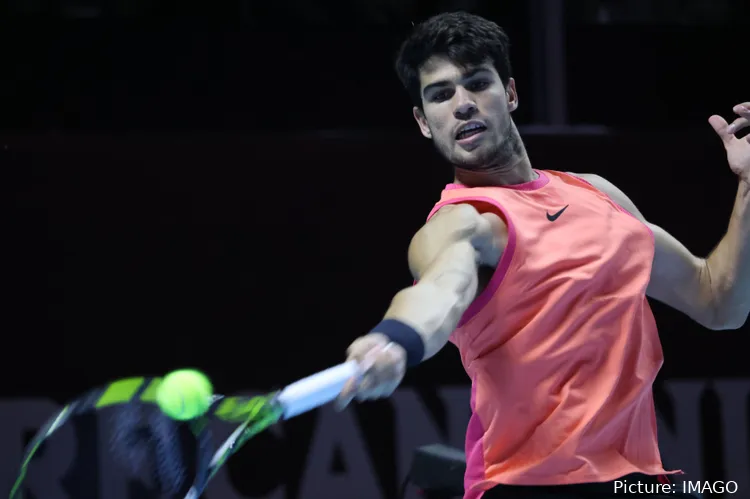
The four-time Grand Slam champion Carlos Alcaraz experienced an unexpected and tough defeat against Casper Ruud, falling 1-6, 5-7 during his ATP Finals debut. The 21-year-old Spaniard came into the match as a favorite, given his exceptional form throughout the season. However, Ruud, who was coming off a rough patch of seven losses in his last eight matches, played with a revitalized focus that caught Alcaraz off guard.
The match began with Alcaraz struggling to find his rhythm. His first-serve percentage was a mere 50%, and he was plagued by 15 unforced errors compared to only six winners. In contrast, Ruud appeared confident, breaking Alcaraz’s serve multiple times and taking the first set 6-1 with a blend of consistency and aggression. Throughout the match, one glaring observation caught the attention of fans and commentators alike: the unusual silence between Alcaraz and his coach, Juan Carlos Ferrero.
Mixed doubles silver medalist from London 2012, Laura Robson, who was present at the match as a commentator, highlighted this uncharacteristic lack of communication. “I was sitting right next to Juan Carlos Ferrero, and they are usually in constant dialogue, but there was none of that,” Robson noted. “Towards the end, I started wondering if Carlos needed something else, but there was nothing between him and his box. That was surprising to me—it just wasn’t the result we expected!”
Robson’s observation underscored a broader issue that became apparent as the match progressed. Alcaraz seemed disconnected and struggled to respond to the energy and momentum shifts on the court. While he displayed glimpses of his top-tier talent by rallying in the second set to take a 5-3 lead, he ultimately could not maintain his level. Ruud capitalized on Alcaraz’s inconsistency, breaking back and winning four consecutive games to clinch the match.
“If you compare the body language of the two player boxes, it was totally different,” Robson continued. “When Casper broke back in the second set, his box was on their feet, encouraging him, maintaining his intensity and footwork. On Carlos’ side, the energy seemed low, and that disparity reflected on the court.”
For Ruud, this victory marked a resurgence and a confidence boost. Despite his recent struggles, his performance against the World No. 3 was nothing short of impressive. “It can be tricky. I kind of knew he was maybe dealing with a bit of a cold,” Ruud admitted after the match. “I’d seen him sniffling and carrying a tissue, so it seemed like he wasn’t at 100% physically.”
While Ruud acknowledged that playing an opponent who isn’t at their physical peak presents unique challenges, he didn’t allow himself to become distracted. “Of course, that’s unfortunate for him, but it’s also part of the game. I knew it coming in and tried to keep him in rallies. It’s tough because when you know someone’s not at their best, it can create pressure. You feel like you have a good chance to win, but you still have to execute,” he explained. “I just tried to stay in my own world, got a strong start with a break, and in the second set, I turned things around with some good tennis to finish the match.”
Alcaraz’s defeat raised questions about his physical condition and mental focus, especially considering his stellar form earlier in the year. His success throughout the season had established him as one of the most consistent and dominant players on the tour. Yet, in this match, he seemed uncharacteristically subdued, with minimal engagement from his coaching team, a fact that Robson and others found striking.
The young Spaniard’s loss in his ATP Finals debut serves as a reminder of the intensity and unpredictability of elite-level tennis. Even for the most talented players, maintaining peak performance requires not only skill but also optimal physical and mental conditions. While Alcaraz will undoubtedly learn from this experience and come back stronger, the match offered a platform for Ruud to showcase his resilience and skill.
In the post-match discussions, many speculated on Alcaraz’s potential fatigue and health issues, which may have played a role in his performance. However, for Ruud, this victory was a reaffirmation of his ability to compete at the highest level, even in challenging circumstances. He demonstrated the value of composure, strategic play, and capitalizing on opportunities—a testament to his grit and determination amid a difficult season.
As Alcaraz regroups and prepares for his next challenge, he will likely reflect on this defeat as a chance to improve and adapt. Meanwhile, Ruud’s triumph positions him as a formidable competitor moving forward in the ATP Finals, with momentum on his side and a renewed sense of purpose. For tennis fans, the match was a reminder of the sport’s thrilling unpredictability, where even the strongest contenders can face unexpected setbacks, and perseverance can lead to remarkable victories.
Leave a Reply